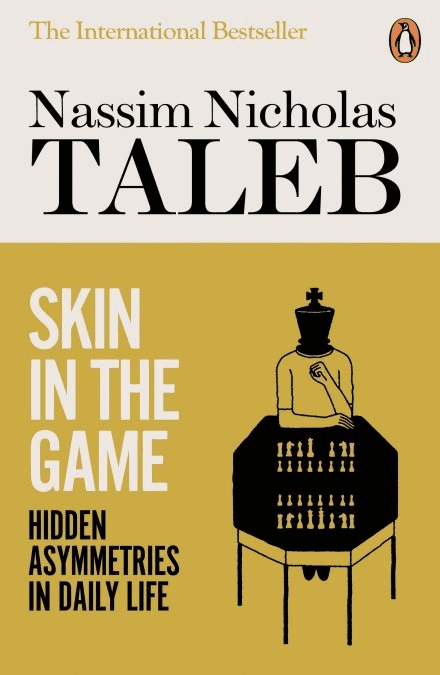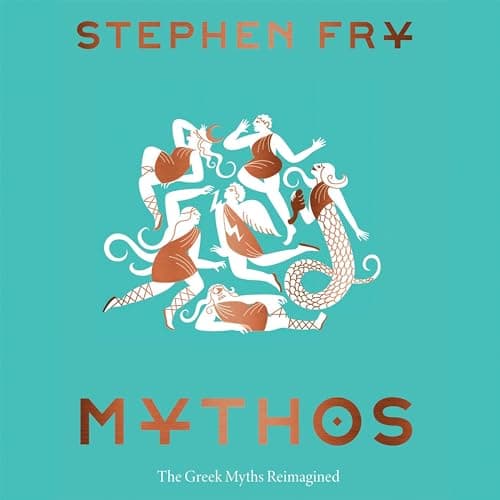Skin in the Game: Hidden Asymmetries in Daily Life vs. Mythos by Stephen Fry
Skin in the Game: Hidden Asymmetries in Daily Life
Skin in the Game: Hidden Asymmetries in Daily Life is a nonfiction book by Nassim Nicholas Taleb, published in 2018. Taleb’s main point is pretty simple: people should share in the risks of the decisions they make. If you benefit from something, you should also face the downsides if things go wrong. He calls this having “skin in the game.” Without that, people can make reckless choices that hurt others while staying safe themselves. The book covers everything from politics and business to religion and everyday life. Taleb doesn’t hold back on criticism. He talks about how some policymakers and financial experts make decisions that affect millions but don’t suffer when those decisions backfire. He uses examples like bankers profiting during booms but getting bailed out during crashes. Taleb also goes after what he calls “Intellectual Yet Idiot” types—educated people who, in his view, complicate things and give advice without understanding real-world consequences. He argues that real k...
Mythos by Stephen Fry
Greek myths retold by Stephen Fry. He is both the author and the narrator of this book. His wit and sense of humor come across in both the text and in the delivery. Plus, you actually get to learn Greek myths.

Reviews
Reviews
| Item | Votes | Upvote |
|---|---|---|
| Insightful and provocative arguments | 1 | |
| Applies to various aspects of life | 1 | |
| Engaging and accessible writing style | 1 | |
| A sensible approach to ethics | 1 |
| Item | Votes | Upvote |
|---|---|---|
| Some arguments can be repetitive | 1 | |
| Taleb's confrontational tone may not appeal to everyone | 1 |
| Item | Votes | Upvote |
|---|---|---|
| No pros yet, would you like to add one? | ||
| Item | Votes | Upvote |
|---|---|---|
| No cons yet, would you like to add one? | ||
Frequently Asked Questions
'Skin in the Game' offers insightful and provocative arguments about ethics and decision-making, making it ideal for readers interested in philosophy and personal accountability. In contrast, 'Mythos' provides a humorous retelling of Greek myths, appealing to those who enjoy storytelling and mythology. The choice between the two depends on whether you prefer a philosophical exploration of ethics or an entertaining narrative of ancient myths.
'Skin in the Game' is noted for its engaging and accessible writing style, which presents complex ideas in a relatable manner. On the other hand, 'Mythos' benefits from Stephen Fry's wit and humor, making the retelling of Greek myths enjoyable. If you prefer a philosophical approach with a direct style, 'Skin in the Game' may resonate more, while 'Mythos' is likely to appeal to those who appreciate humor and storytelling.
'Skin in the Game' provides practical insights into ethics and decision-making, emphasizing the importance of personal risk and accountability in various aspects of life. In contrast, 'Mythos' serves primarily as an entertaining retelling of myths without the same level of practical application. Therefore, if you are looking for actionable insights, 'Skin in the Game' would be the better choice.
'Skin in the Game: Hidden Asymmetries in Daily Life' is a nonfiction book by Nassim Nicholas Taleb that argues people should share in the risks of their decisions. Taleb emphasizes that if someone benefits from a decision, they should also face the potential downsides. The book critiques various sectors, including politics and finance, highlighting how decision-makers often escape the consequences of their actions. It explores themes of accountability and the importance of real-world experience over theoretical knowledge.
Nassim Nicholas Taleb is a Lebanese-American essayist, scholar, and statistician known for his work on risk, uncertainty, and decision-making. He is the author of several influential books, including 'The Black Swan' and 'Antifragile.' Taleb's writing often critiques conventional wisdom and emphasizes the importance of practical experience in understanding complex systems.
Pros of 'Skin in the Game' include its insightful and provocative arguments, applicability to various aspects of life, engaging writing style, and a sensible approach to ethics. However, some cons are that certain arguments can be repetitive, and Taleb's confrontational tone may not appeal to everyone.
The main themes of 'Skin in the Game' include accountability, the importance of sharing risks in decision-making, the critique of policymakers and financial experts who evade consequences, and the influence of stubborn minorities on societal choices. Taleb also discusses the concept of real knowledge being derived from practical experience rather than theoretical understanding.
Nassim Nicholas Taleb's writing style in 'Skin in the Game' is direct and sometimes blunt. He is known for his no-nonsense approach, which some readers appreciate for its clarity and honesty, while others may find it overly combative or confrontational.
'Mythos by Stephen Fry' is a retelling of Greek myths. Stephen Fry, who is both the author and the narrator, brings his signature wit and sense of humor to the stories. The book covers various Greek myths, providing an entertaining and educational experience.
Stephen Fry is a British comedian, actor, writer, and presenter. He is known for his sharp wit and intelligent humor. He has written several books and has narrated many audiobooks, including 'Mythos,' where he retells Greek myths with a unique and engaging style.
The main features of 'Mythos by Stephen Fry' include its engaging retelling of Greek myths, Stephen Fry's witty and humorous writing style, and his captivating narration in the audiobook version. The book offers both entertainment and educational value, making it a delightful read for those interested in mythology.




















